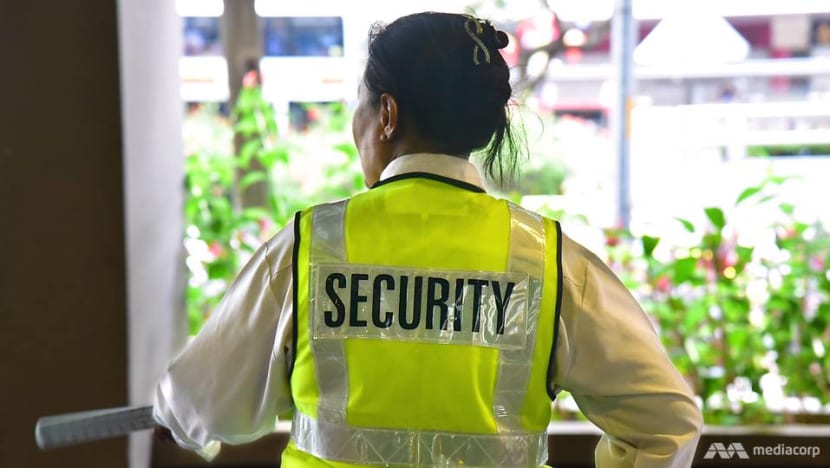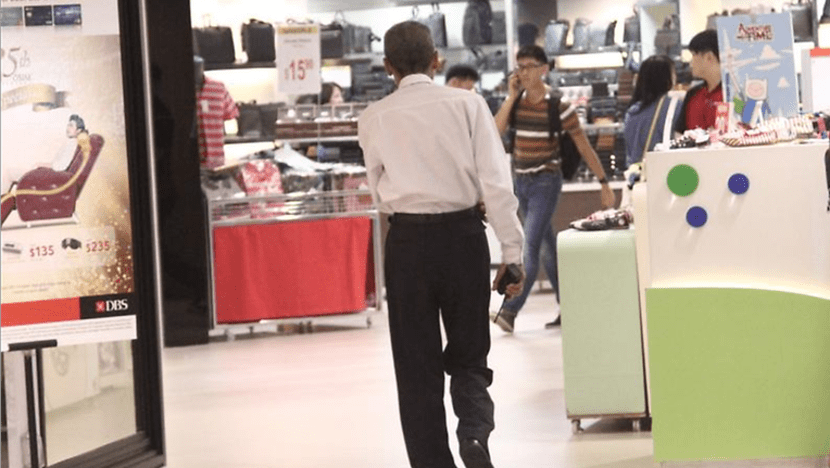Commentary: Why do security guards get abused more than others?
They must enforce rules, but they don’t have power – and this disconnect makes them an easy target for frustrated people, says SUSS’ Victor Seah.

A security guard in Singapore. (Photo: Gaya Chandramohan)
SINGAPORE: Drive down a road lined with schools in the morning often enough and you will soon learn to avoid the two leftmost lanes.
The traffic chaos that is the morning school run has been the subject of recent news coverage, not least because of a man who drove into an elderly security officer in a bid to force his way into Red Swastika School.
Sadly, such acts of abuse are not isolated events. Research conducted by the Union of Security Employees (USE) and SUSS’s Centre for Applied Research found that over 40 per cent of 1,002 surveyed security officers reported experiencing verbal or physical abuse at work.
“How can the parents do this? How will their children face their peers? Have they no care for their child’s well-being?”
“What kind of values are we teaching our kids?"
"The driver should be grateful for the security guards who are not highly paid and yet risk their lives to protect us”.
These social media comments, perfectly reasonable in hindsight, were unlikely to have been considered by the Bentley driver when he advanced into the security officer. Indeed, the driver has now been arrested for a “rash act causing hurt”.
HEAT OF THE MOMENT REACTIONS
Once triggered, abusers are likely to be engaging in heat-of-the-moment snap reactions. There are two broad and interacting factors that may account for why such snap reactions result in acts of abuse: Motivators and enablers. In some cases, abusers may be originally motivated by a perverse sense of problem solving.
Parents on school runs report traffic jams and queue-cutting as a daily affair.
It may be that some parents who attempt to cut the queue are doing so in a perverse bid to do things better (there are no cars exiting now so we should use the other lane too), or ironically, to reclaim fairness (others are cutting queue so I should too).
This kind of reasoning is not uncommon. We sometimes find ourselves in a chaotic situation and think the guard may not be doing a good job in handling traffic efficiently, so we act to “fix” things.
DISPLACED ANGER AND FRUSTRATION
The directing of displaced anger and frustration onto security officers is a second motivating factor that may explain why security officers receive abuse.
In enforcing the rules, security officers often must deny abusers their goals (for instance, preventing someone who is not vaccinated from entering a mall), or impose unwanted constraints or requirements (for instance, requiring condominium visitors to register before entry) and all of these are frustrating to people.
While abusers are incapable of venting their anger and frustration towards the authority imposing the rule (like the Government or condominium management committee), security officers are often a less threatening and more available target.
This may explain why the USE and SUSS survey found that older security officers experience more incidences of abuse. In the words of a young security officer, the older security officers “look easy to makan (colloquial term for “take advantage of”)”.
Then there are what we call enabling factors. The power imbalance between security officers and their abusers, the low perceived cost of abusing security officers, and the large psychological distance between security officers and their abusers.

The job of a security officer is an ambiguous occupation, concludes a 2010 study asking the Dutch public of their perceptions of security officers.
On questions about whether security work is complex, dangerous and stressful, respondents were roughly equally split between agreeing, neither agreeing nor disagreeing, and disagreeing.
One reason may be that security officers do a lot. Apart from controlling traffic and enforcing COVID-19 regulations, security officers give directions, fight fires, attend to the injured and help people stuck in lifts, all while making less than the national median income.
While we ask our security officers to do a lot, they actually have very little power, especially vis-a-vis would-be abusers such as residents, parents and customers – people whom the hiring organisation is keen to please.
Steve Tan, executive secretary of USE, acknowledged that the remedy for verbal abuse, if proven, is usually very limited, often in the form of a warning. This is the second enabling factor – some may perceive the cost of abusing security officers to be low.
Indeed, NMP and Security Association of Singapore president Raj Joshua Thomas expressed surprise that the Red Swastika School incident occurred so quickly after the amending of the Private Security Industry Act which increased the penalties for abusing security officers.
The Act was amended last year, and jail terms were doubled from six to 12 months for people found guilty of intentionally harassing guards. The penalty for assault is a S$7,500 fine and imprisonment of up to two years.
GREATER PSYCHOLOGICAL DISTANCE
Finally, there is greater psychological distance between those who work in jobs like security and people they encounter every day.
Variations to the well-known Milgram experiment, which instructs study volunteers to administer electric shocks as punishment to a learner for getting the answer wrong, found that the greater the psychological distance, the more frequent and intense were the electric shocks administered by study volunteers.
In one version of the experiment, only 15 per cent of volunteers agreed to shock a relative or a neighbour. The point is clear: It is easier to ill-treat someone who is perceived to be dissimilar to us because our psychological distance is much wider.
Throughout human history, we have seen evidence of this – genocide victims and prisoners-of-war. Closer to home, it is domestic helpers, migrant workers and now, security officers who tend to be treated poorly.
How do we prevent future occurrences of abuse against security officers?
The wide attention brought about by this incident and growing awareness of the heavy penalties will challenge those who had perceived the cost of abusing security officers to be low.
The strengthened Private Security Industry Act increases the power of security officers.
At an individual level, we can all work towards reducing the psychological distance between us and the security officers whom we interact with regularly. To see them as people who aren't that different from us – they too have a job to do, families to feed and frustrating circumstances to navigate in a given workday.
A hello, a nod of the head, and a thank you are simple acts that we can all do to bridge this distance. If nothing else, it is a small acknowledgement of the unambiguously difficult work that security officers do.
Dr Victor Seah is Deputy Head, Psychology Programme, School of Humanities and Behavioural Sciences at the Singapore University of Social Sciences.




















